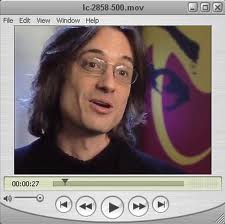 A reader sent me an email today:
A reader sent me an email today:
Dear Diane,
I will be representing SCORE on a small business management segment online later this week. I know the subject matter well. I just need your suggestions and tips as being interviewed on video is new territory for me.
****************************************************************************************************************************************************************
Video marketing is a powerful medium. When you're invited as an expert will you be ready? Here are some media training tips for when you present on video:
Look at the host who is interviewing you. If it’s a webcam feed, then look directly into the camera. With built in webcams, you may have to look up in order to be eye-to-eye with the viewers. That means you won’t see your notes on the screen too easily.
Begin with a hook to grab their attention-a statistic, a statement. Ex. "Host, Did you know that 80% of small businesses fail when using ecommerce?"
Build in a quick success. Ex." One client increased his online revenues when he learned to do this one thing…"
Speak in soundbites. This is critical. Write down 3-6 main messages. Each point should be one sentence, one thought. Say it crisply and then give an example. There’s no time for long storytelling in a media interview.
Video segments must move quickly.
Keep your language simple. Aim for 8th grade language. Avoid using too many technical terms. Use simple analogies. Ex. "Not having an ecommerce site is like not having a phone".
Talk from the audience view point. Don’t assume they know what you’re talking about. Provide value. What do they care about? Talk to those issues. Don’t be too detailed or they will tune out.
Be passionate. Video is an energy drain. That means you’ll seem more enthusiastic live than on the screen. So push your energy-especially in your vocal tone. Emphasize key words.
Be yourself. Sound like you’re having a conversation. Don’t talk at the audience; converse with them.
Don’t over gesticulate. Fast movements may not televise well.
Smile. You need to look friendly and inviting.
Imagine the audience. If you’re talking into a webcam you won’t be able to see reactions so get a picture in your mind of people responding to you.
Keep your head still. Your head should be straight on your neck with little or no tilting.
Sit or stand up straight. Slouching will send a negative message.
Know what is behind you as background. Are you in someone’s studio? Ask about the backdrop color. You don’t want to wear black if the background is black.
Check your appearance in a mirror right before the interview. Check for dandruff, a crooked tie, fly away hair, or shine. Use some dusting powder to avoid shine on the face or bald spots. Use hair spray and take it with you. Hair that stands up is distracting.
Don’t wear loud prints or large check patterns. They don’t televise well.
PAUSE between thoughts. This will eliminate /ums/ and allow time for the message to land.
End with food for thought or an action step. Ex. "Businesses are leaving money on the table when it comes to ecommerce. Go to www._________for a free assessment."
Remember it’s not about you-it’s about them (the audience).
Media training is no longer for authors and celebrities. Whether you're interviewing for a job, speaking as a guest expert online, or even sending a video email to your friends, all public speakers will eventually use the powerful medium of video presentations.


 For years I've been saying that speakers will need broadcasting skills. Well, the future is now. Recently, I was asked to do a
For years I've been saying that speakers will need broadcasting skills. Well, the future is now. Recently, I was asked to do a  The first presidential debate on October 3, 2012 belongs to Mitt Romney. It was a clear win in terms of content and delivery. Both candidates began cordially and gracefully. The President acknowledged his wife on the evening of their 20th anniversary. Mitt Romney also congratulated him and quipped about how Obama probably didn't want to spend a romantic evening on stage with him.
Both candidates are skilled public speakers. They each looked presidential but Romney owned the room with his rapid fire responses, his knowledge of the facts, and his aggressive approach. He seemed more relaxed and natural and was finally able to humanize his image by talking about people he had met on the campaign trail and correcting any inaccuracies about his policies. What was especially effective was his ability to speak crisply as he quickly enumerated three to four points he wanted to make. He made direct eye contact with Obama and his passion was evident. Gone was his robotic delivery.
The first presidential debate on October 3, 2012 belongs to Mitt Romney. It was a clear win in terms of content and delivery. Both candidates began cordially and gracefully. The President acknowledged his wife on the evening of their 20th anniversary. Mitt Romney also congratulated him and quipped about how Obama probably didn't want to spend a romantic evening on stage with him.
Both candidates are skilled public speakers. They each looked presidential but Romney owned the room with his rapid fire responses, his knowledge of the facts, and his aggressive approach. He seemed more relaxed and natural and was finally able to humanize his image by talking about people he had met on the campaign trail and correcting any inaccuracies about his policies. What was especially effective was his ability to speak crisply as he quickly enumerated three to four points he wanted to make. He made direct eye contact with Obama and his passion was evident. Gone was his robotic delivery. The political stage is a fascinating study of the power of the presentation. When it comes to public speaking and
The political stage is a fascinating study of the power of the presentation. When it comes to public speaking and Last night I was a guest speaker for ABWA. My presentation was Speak Powerfully Sell More: Speak Your Way to More Business.
One woman in the audience asked a question about how to handle a celebrity who is hired to speak and doesn't deliver. This woman went on a rant about how many of these celebrities are not good speakers and yet meeting planners continue to hire them. I explained that the reason for that was event planners want to sell tickets. An event will sell out when the keynote speaker is a celebrity.
Last night I was a guest speaker for ABWA. My presentation was Speak Powerfully Sell More: Speak Your Way to More Business.
One woman in the audience asked a question about how to handle a celebrity who is hired to speak and doesn't deliver. This woman went on a rant about how many of these celebrities are not good speakers and yet meeting planners continue to hire them. I explained that the reason for that was event planners want to sell tickets. An event will sell out when the keynote speaker is a celebrity. Mitt Romney was invited to speak to the NAACP knowing that it's members are overwhelmingly Democratic. He acknowledged and thanked his hosts and expressed his honor at being invited.
He made an attempt at humor by saying “I hope the Obama campaign doesn’t think you’re playing favorites.“ There was a mild tittering from the crowd.
Mitt Romney was invited to speak to the NAACP knowing that it's members are overwhelmingly Democratic. He acknowledged and thanked his hosts and expressed his honor at being invited.
He made an attempt at humor by saying “I hope the Obama campaign doesn’t think you’re playing favorites.“ There was a mild tittering from the crowd.




